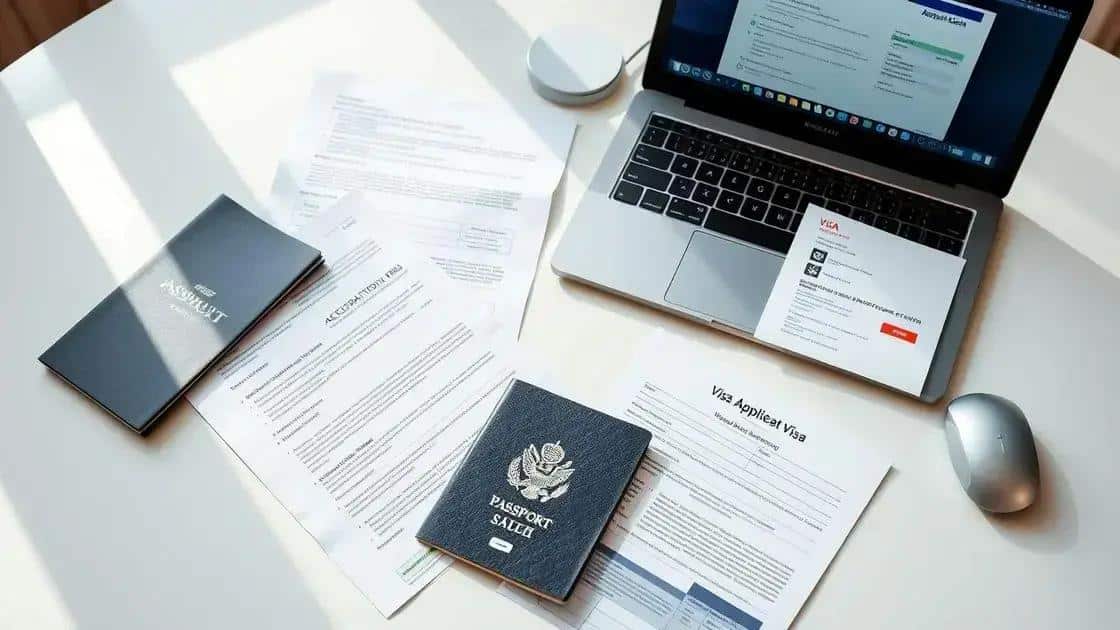International student visas: your guide to success

Anúncios
International student visas allow foreign students to study abroad, requiring essential documents like an acceptance letter, proof of finances, and successful visa interview preparation to ensure a smooth application process.
International student visas play a vital role in your journey to study abroad. Have you ever wondered how to navigate the application process effectively? This article will guide you through key insights and useful tips.
Anúncios
Understanding international student visas
Understanding international student visas is essential for those aspiring to study abroad. These visas grant you the opportunity to experience new cultures and academic environments. Let’s dive into the key aspects of these visas.
What is an International Student Visa?
An international student visa allows a foreign national to reside in a country temporarily while they pursue their studies. Each country has specific regulations defining their visa types.
Anúncios
Types of International Student Visas
- F-1 Visa: Commonly used in the United States for academic students.
- J-1 Visa: For exchange visitors, including interns and researchers.
- Tier 4 Visa: The UK visa for studying full-time.
- Student Pass: Commonly used in countries like Singapore.
Choosing the right visa is crucial as it affects your ability to work and stay in the country. The application process can vary, with different documentation required based on the visa type.
Common Requirements for Visa Applications
While requirements differ by country, most applications will need:
- Proof of admission to an accredited institution.
- Evidence of financial resources to support your stay.
- Valid passport and photographs.
In addition to these, you may need to provide a statement of purpose or proof of health insurance. Understanding these requirements can help simplify your application process.
Once you’ve gathered your documents, consider the timing of your application. Submitting your visa request early can alleviate stress and increase your chances of approval. Don’t hesitate to seek assistance from education consultants or your school’s international office if you have questions.
Staying Compliant with Visa Regulations
After obtaining your international student visa, adhering to the terms is mandatory. Maintain your enrollment status and meet any required attendance benchmarks. Additionally, working outside the allowed hours could jeopardize your visa status.
In summary, understanding the ins and outs of international student visas can greatly impact your educational journey. By preparing adequately and respecting visa conditions, you can focus on your studies and enjoy the experiences that lie ahead.
Types of international student visas
When applying for a visa, it’s important to know the different types of international student visas available. Each visa category caters to specific academic needs and circumstances. Here are some of the most common types of student visas.
F-1 Visa
The F-1 visa is primarily for academic students in the United States. It allows you to study full-time at an accredited institution. To qualify for an F-1 visa, you must be enrolled in a program that leads to a degree or certificate.
J-1 Visa
The J-1 visa allows foreign exchange students, scholars, and interns to participate in work-and-study-based exchange visitor programs. This visa promotes cultural exchange and requires participants to return to their home countries for at least two years after their program ends.
Tier 4 Visa
The Tier 4 visa is aimed at international students who wish to study in the United Kingdom. It is applicable for courses that last six months or longer at a recognized institution. This visa provides the necessary permissions to live and study in the UK.
Student Pass
In countries like Singapore, the Student Pass is essential for international students who want to study. This pass permits students to attend classes. You must hold a valid acceptance from a recognized educational institution to apply.
Each of these visa types comes with its own requirements and regulations. Before applying, it’s crucial to research and understand the eligibility criteria, documentation needed, and any restrictions associated with your chosen visa.
Failing to comply with the rules of your visa category can lead to severe consequences, including deportation or being banned from future entry. Therefore, always keep yourself informed about the terms and conditions of your visa.
In conclusion, knowing the different types of international student visas is essential for a smooth application process and studying abroad experience. Make sure to select a visa type that suits your educational goals and adhere to its guidelines for your academic journey.
Essential documents for visa application

When applying for an international student visa, you need to prepare several essential documents. These documents play a critical role in your application process and demonstrate your eligibility to study abroad. Let’s look at the necessary paperwork.
Passport
Your valid passport is the primary document. It should be valid for the entire duration of your stay in the foreign country. Make sure it has sufficient blank pages for the visa stamp.
Acceptance Letter
You will need an acceptance letter from an accredited educational institution. This letter confirms that you have been accepted into a specific program, which is vital for your visa application.
Financial Documents
Proving you have enough funds is crucial. You may need to provide:
- Bank statements showing sufficient funds.
- Scholarship letters, if applicable.
- Financial affidavits from sponsors.
These documents demonstrate that you can support yourself without needing to work illegally.
Proof of Health Insurance
Many countries require proof of health insurance as part of the visa application. This ensures you have coverage for medical expenses during your stay. Look for plans that meet the country’s requirements.
Visa Application Form
Filling out the visa application form accurately is essential. Each country has specific forms and processes, so check the official embassy or consulate website for guidance. Incorrect or incomplete forms can delay your application.
In addition to these essential documents, you might need to provide photographs and pay the visa fee. Make sure to check the specific requirements for the country where you are applying.
Always keep copies of everything you submit, and ensure that all your documents are organized. This makes the process smoother and helps avoid unnecessary issues.
Common challenges in securing a visa
Securing an international student visa can come with several challenges. It’s important to understand these issues so you can prepare effectively. Let’s explore some of the common hurdles students face during the visa application process.
Documentation Issues
One of the primary challenges is gathering the correct documentation. Students often struggle to provide all the necessary papers, such as acceptance letters, financial statements, and proof of health insurance. Each country has specific documentation requirements, and missing even one document can delay or prevent your application.
Financial Proving
Another significant hurdle is proving you have sufficient funds. Immigration authorities need assurance that you can afford tuition and living expenses. This can be daunting if you do not have clear financial backing or if documentation from sponsors is unclear or incomplete.
- Bank statements that do not clearly show the necessary funds can be problematic.
- Scholarship documentation must be in order and verified.
- Proving sponsorship from family may require additional legal documents.
These complications can add stress to the process, so it’s advisable to have all financial documents ready and verified beforehand.
Interview Process
The visa interview is another common challenge. Many students feel nervous and unprepared. The interviewers may ask questions about your study plans, financial situation, and intentions to return home after your studies.
To handle this, practice is essential. Understand the types of questions that may arise and prepare clear, concise answers. Being calm and confident can greatly improve your chances of a successful interview.
Delays and Processing Times
Lastly, delays in processing times can frustrate many applicants. Depending on the country, visa processing can take weeks or even months. It’s crucial to apply early to avoid any potential issues that can disrupt your study plans.
Be aware of deadlines for both your application and your intended start date at your educational institution. Staying informed about processing times can help you manage your expectations and plan accordingly.
Tips for a successful visa interview
Preparing for a successful visa interview is key to securing your international student visa. This process may seem daunting, but with the right preparation, you can approach it with confidence. Here are some effective tips to help you succeed.
Research the Common Questions
Before your interview, take the time to research common questions that interviewers might ask. Some typical questions include:
- Why do you want to study in this country?
- What is your planned course of study?
- How will you finance your education?
By preparing for these questions, you can develop clear, concise answers that reflect your motivation and plans.
Practice Your Responses
Practicing your responses is essential. You can conduct mock interviews with friends or family members. This can help reduce anxiety and improve your comfort level during the actual interview. Practice speaking clearly and confidently, and ensure that your answers are direct and relevant to the questions asked.
Gather Necessary Documents
Make sure to have all necessary documents ready for your interview. Essential documents include:
- Your passport
- The acceptance letter from your educational institution
- Financial proof, such as bank statements
Being organized and having everything on hand will help you appear more prepared and serious about your application.
Dress Professionally
The way you present yourself matters. Dressing professionally can help make a positive first impression. Choose clothing that is neat and appropriate for an interview setting. This shows respect for the interview process and reflects your seriousness about studying abroad.
Be Honest and Open
During the interview, it’s crucial to be honest in your responses. If you do not know the answer to a question, it’s better to admit it than to invent an answer. Interviewers appreciate transparency and sincerity. Ensure you answer questions accurately and provide any extra information requested.
Lastly, maintain a positive attitude throughout the interview. A smile and firm handshake can make a significant difference in how you are perceived by the interviewer. Approaching the interview with optimism can be beneficial.
FAQ – Frequently Asked Questions about International Student Visas
What documents do I need for my student visa application?
You typically need your passport, acceptance letter from your school, financial proof, and health insurance documentation.
How can I prepare for my visa interview?
Research common interview questions, practice your answers, and ensure all your documents are organized and ready.
What are the common challenges in securing a student visa?
Common challenges include documentation issues, proving financial stability, and dealing with possible delays in processing.
What should I do if my visa application is denied?
If denied, carefully review the reason for denial, address the issues, and consider reapplying or seeking further guidance from immigration experts.






